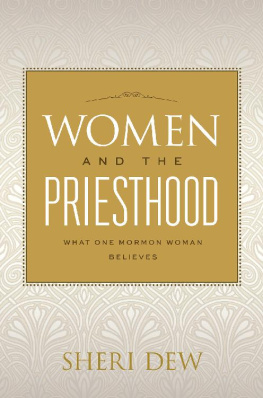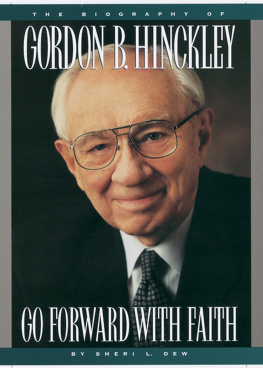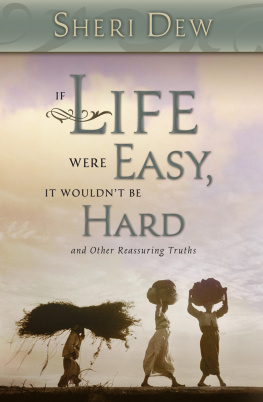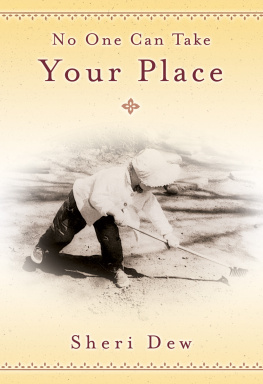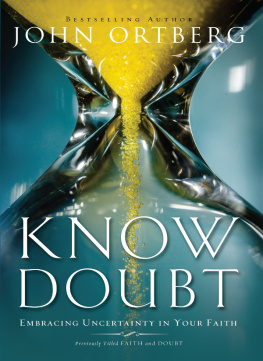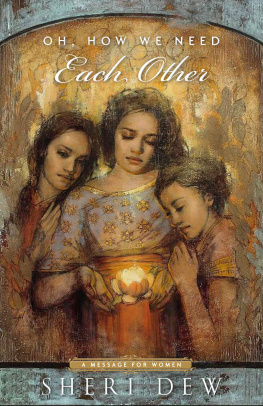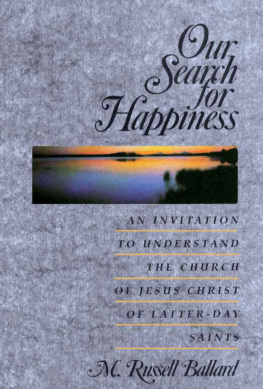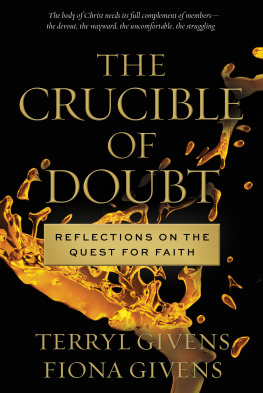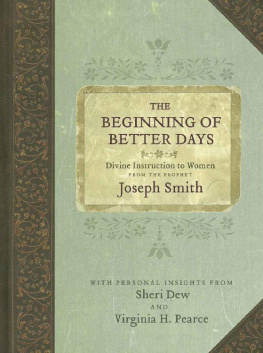2001 Sheri L. Dew.
All rights reserved. No part of this book may be reproduced in any form or by any means without permission in writing from the publisher, Deseret Book Company, P.O. Box 30178, Salt Lake City Utah 30178. This work is not an official publication of The Church of Jesus Christ of Latter-day Saints. The views expressed herein are the responsibility of the author and do not necessarily represent the position of the Church or of Deseret Book. Deseret Book is a registered trademark of Deseret Book Company.
Library ofCongress Catalog Card Number: 2001095035
ISBN 1-57345-932-1 (hardbound)ISBN-10 1-57008-925-6 (massmarket)ISBN-13 978-1-57008-925-1 (massmarket)
Printed in the United States of America
Banta, Menasha, WI
10 9 8 7 6
FOR GRANDMA

AKNOWLEDGMENTS

I dedicated this book to my grandmother because, even though she died when I was only eleven, her influence on my testimony was penetrating and profound. In the same regard, I express deep gratitude to my parents for teaching me the gospel. I never cease to marvel at the power and responsibility one generation has to influence and teach another.In like manner, I would hope to have some influence for good on the younger generation in our family. Because this book records the essence of my testimony to this point in my life, I also dedicate it to my favorite young women and young men in heaven and on earth. This book is really for you:
Cory, Lindsay, Megan, Tiffany, Tanner, Andrew, Breanne, Aubrey, Amanda, Nicole, Audrey, Trevor, Emily, Natalie, Tyson, Matthew,and Spencer
INTRODUCTION
I HAVE COME TO KNOW FOR MYSELF

ALTHOUGH THERE ARE MANY THINGS ABOUT THIS LIFE THAT I DO NOT UNDERSTAND, THERE ARE SOME TRUTHS ABOUT WHICH I NO LONGER HAVE ANY DOUBT.
A FEW YEARS AGO I was waiting to catch a plane in New York City, and inuncharacteristic fashion I was there enough ahead of time to actually sit downin the airport. As I scanned a newspaper, a commotion caused me to look up, andwhat I saw made me smile. Walking down the concourse was a large group ofmissionaries who were talking, laughing, and just generally causing a stir. Asthey turned en masse into mygate and began to present their tickets to the gate agent, it became obviousthat we were on the same flight to Salt Lake City. Before we boarded the plane,we had a chance to get acquainted, and I learned that they had each beenserving somewhere in eastern EuropeRomania, Ukraine, and Russia among them. These young men and women were bubbling over with the exuberance (and nodoubt the anxiety) of returning missionaries and were eager to talk to anyonewho would listen about their two-year adventure serving the Lord.
One elder in particular was unforgettable. A young farm boyfrom central Utah, he had been serving in Bulgaria. When I asked him about hismission, he said with no small amount of enthusiasm and energy, It was great!
At that, I pursued a little further: Elder, I understand that Bulgaria has its challenges. Was your mission difficult?
Oh, he responded with passion, it was so hard! You cant imagine how hard it was. My missionmust have been the hardest mission in the world!
I was grinning when I responded: Well, Elder, if your missionwas so difficult, then why was it so great?
With a flair for the dramatic, he struck a Napolean-like poseand declared, Because I did what they sent me to do. And I left Bulgaria better than I found it!
As we flew back to Salt Lake City, this elders words keptrunning through my mind. When it comes time to step across the veil, dont weeach hope to be able to give a similar report at the end of our mission here, I did what I was sent to do. And I tried to leave the people I met and theplaces I went better than I found them.
President Gordon B. Hinckley expressed a similar sentiment, butwith more eloquence: You are good. But it is not enough just to be good. Youmust be good for something. You must contribute good to the world. The worldmust be a better place for your presence. And that good that is in you must bespread to others (BYU Speeches ofthe Year, 1996).
Playwright Maxwell Anderson put these words into the mouth ofthe French peasant girl Joan of Arc: Every woman gives her life for what shebelieves. Sometimes people believe in little or nothing, nevertheless they giveup their lives to that little or nothing. One life is all we have, and we liveit as we believe in living it, and then its gone (Joan of Lorraine, act 2).
I have felt grief. You have felt grief. But I cant imaginepain greater than stepping across the veil and realizing I had not done what Ihad come here to door realizing that I had given up my life to little ornothing, only then to find that it was gone.
We have the magnificent blessing, and the accompanyingresponsibility, of knowing precisely what we are here for. Our stint inmortality is a probationary state; a time to prepare to meet God (Alma12:24), a time to repent and serve God (Alma 42:4), a day for men [and mostassuredly women] to perform their labors (Alma 34:32), a time to prove whetheror not we will do all things that the Lord commands us to do (see Abraham3:25).
How critical, then, that we be wise and not waste thismarvelous but challenging opportunity to prepare and prove ourselves worthy ofreturning to live with our Father and His Son. Jacob set forth the challengesuccinctly: O be wise; what can I say more? (Jacob 6:12). And Brigham Youngsaid it this way: This is a world in which we are to prove ourselves. Thelifetime of man is a day of trial, wherein we may prove to God, in ourdarkness, in our weakness, and where the enemy reigns, that we are our Fathersfriends (Discourses of BrighamYoung, 87). He continued: You were organized, and brought into being,for the purpose of enduring forever, if you fulfil the measure of yourcreation, pursue the right path, observe the requirements of the celestial law,and obey the commandments of our God (Discoursesof Brigham Young, 87).
So, what have weas men and women of God, as the Lordscovenant peoplecome here to do? And amidst all of the challenges androadblocks, the disappointments and discouragements, the stresses andpressureshow do we do what we have come here to do?
There is much we can learn from Joseph, who was sold into Egypt. Imagine the trauma of being betrayed by his older brothers, separated from hisfamily as a boy, and forced to survive in a completely foreign (and initiallyhostile) environment. And yet, in spite of these difficult circumstances,Joseph lived with integrity, virtue, and faith.
When he was reunited with his conniving brothers many yearslater, courtesy of a famine in Canaan that forced them to seek grain in Egypt, an interesting scenario played out. Joseph dispatched his brothers back to Canaan to retrieve their father. Of all the things he could have said to his unreliablebrothers as they prepared to depart, his last words of instruction were simply, See that ye fall not out by the way (Genesis 45:24).


